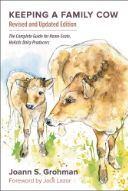Post by haecklers on Nov 19, 2014 5:01:30 GMT -5
I'm pretty curious what your take is on Heifer International. When I was a kid they gave cows like holsteins to Third World families so they could benefit from our "improved" breeds. But the cows are so high input and have such high nutritional needs, I don't think they'd do as well in rustic situations. They also seem to think goats are very hardy but the improved dairy goats sometimes seem to be looking for creative new ways to die. Plus, the local breeds would have adapted to the local conditions and parasites, etc. Shipping modern animals to them seems like a bad idea.
Through World Vision we sent a family enough money to get in their chicken project. They got 50 chicks, some bags of feed, and a class. For some reason all of their chicks died. I think the natural progression for a farmer is to start smaller, learn as they go, make mistakes on fewer animals, and maybe have friends to turn to if something goes wrong, and I worry with an NGO if they get used to getting "all the answers" from them, then the NGO moves on, what happens.
They also say they teach people the "non-grazing" method - where the animals are penned and the land is used to raise crops. The director says that's more sustainable. -?? It seems to me that pasturing animals is sustainable, while tilling the land to grow crops results in decreasing soil fertility.
I've worked in non-profits before where there's a lot of sophistication in keeping the funding, i.e. they strategically don't ask the wrong questions (the ones that show they're not doing a wonderful job). I guess it's made me jaded. :/
Through World Vision we sent a family enough money to get in their chicken project. They got 50 chicks, some bags of feed, and a class. For some reason all of their chicks died. I think the natural progression for a farmer is to start smaller, learn as they go, make mistakes on fewer animals, and maybe have friends to turn to if something goes wrong, and I worry with an NGO if they get used to getting "all the answers" from them, then the NGO moves on, what happens.
They also say they teach people the "non-grazing" method - where the animals are penned and the land is used to raise crops. The director says that's more sustainable. -?? It seems to me that pasturing animals is sustainable, while tilling the land to grow crops results in decreasing soil fertility.
I've worked in non-profits before where there's a lot of sophistication in keeping the funding, i.e. they strategically don't ask the wrong questions (the ones that show they're not doing a wonderful job). I guess it's made me jaded. :/







